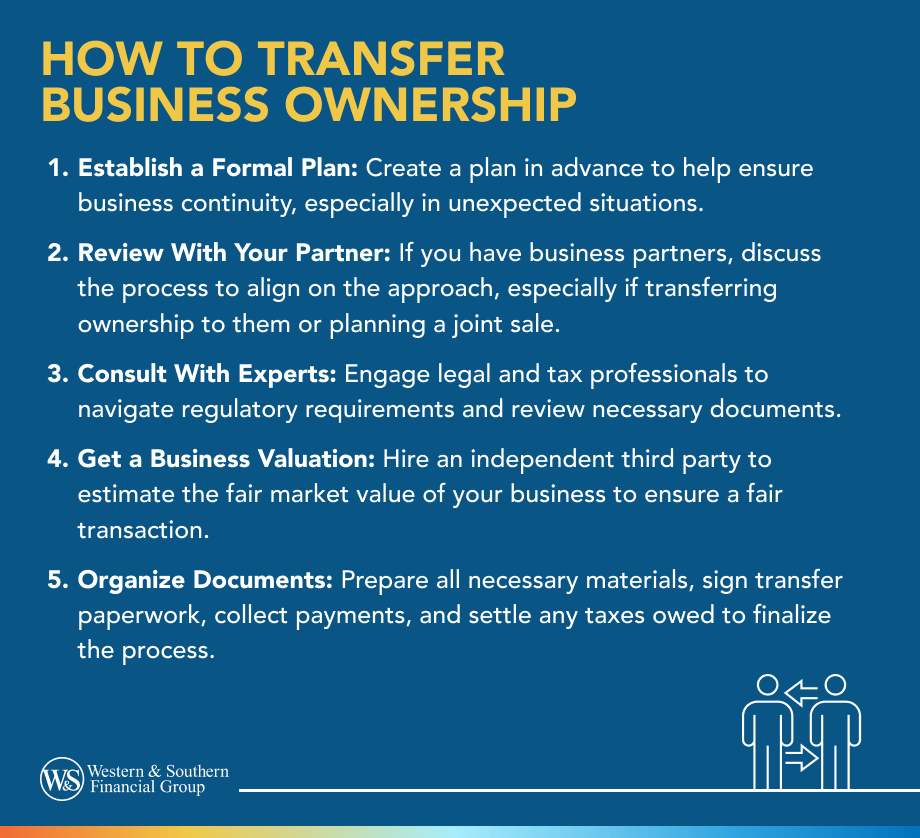

Table of Contents
Key Takeaways
- There are various reasons why someone may want to transfer business ownership, such as retirement, succession planning for family members, bringing on a business partner, or selling to a third party.
- The process involves creating a formal transfer plan, reviewing plans with partners, consulting experts, getting a business valuation, and getting documents in order.
- For family businesses, transferring ownership to children through succession planning is common.
- Selling to a third party can provide cash upfront or owner financing over time.
- It's important to consult legal and financial experts to help ensure the transfer goes smoothly and meets any regulatory or tax requirements.
Back when you started your business, perhaps you never thought you would sell it. But sometimes, plans change, and a business transfer may begin to look like an attractive option. Maybe you've started to think about selling your business and moving on to something new. Or perhaps you'd like someone else to take over so you can enjoy more free time with your family and friends.
If that's the case, you might be wondering how to transfer business ownership. Even if you aren't entirely sure if you want to do it right now, it can still help to familiarize yourself with the process and your options.
When Might You Transfer Business Ownership?
There are plenty of reasons why someone might want to do a business transfer. It might be because of retirement, or the unexpected could happen, and you may need to transfer ownership because you are no longer able to run the business on your own. Here are just a few of the common scenarios.
Transfer It to a Business Partner
Maybe you and your partner started your business in a garage 30 years ago and, after decades of hard work, you're ready to retire and spend more time traveling with your family. You may want to transfer your share of the business to your business partner if they don't want to sell.
Keep It in the Family
Many small businesses are family businesses. So it's not at all uncommon in this instance for small business owners to make a succession plan, which helps you determine how you want your business to run once you're not interested or able to anymore.
For a lot of family-owned small businesses, that may mean transferring ownership to your children.
Sell to a Third Party
Sometimes, transferring ownership involves an outright sale to a third party. This sale could come at the end of a long career running the company, or some people may create a five-year business plan that includes high growth with an exit at the end of that period.
With this option, you can sell your small business for cash upfront from the buyer or work out a long-term owner-financing plan with the buyer.
How the Business Transfer Process Works
Beyond understanding why you might choose to sell a business, you may still wonder exactly how to transfer business ownership in the event you do choose to sell. In general, a business transfer takes some time, so you'll likely want to prepare for and think about it in advance — especially if you have business continuity concerns.
The process usually involves the following steps:
- Establishing a formal plan: Some business owners create a plan before they ever think of selling. This plan can help to ensure business continuity in the event of the unexpected. Some business owners may also choose to create a buy-sell agreement, which is a document that sets a path for a smooth transfer.
- Reviewing with your partner (if you have one): If you have a business partner or partners, you'll likely want to discuss the process and plan with them to make sure you're all on the same page. This likely matters if you're transferring ownership to them or if you are both selling outright.
- Consulting with the right experts: In some industries, transferring business ownership might involve some particular regulatory or jurisdictional requirements. Consider consulting with a legal expert to review any additional documents or processes you might need before moving forward. Also, consider discussing the potential transfer with a tax professional.
- Getting a business valuation: It might be a good idea to contact an independent third party who can give you an estimate of the fair market value of your business .
- Getting your documents in order: Once you're ready to proceed with the transfer, make sure all of your materials are in order and ready to go. From there, you will likely sign the paperwork to transfer the business, collect any money you're owed, and pay any required taxes.
A business transfer can be a long process, so it's important to be prepared. Work with the right legal and financial professionals to determine the best course of action for your particular situation.
The Bottom Line
It never hurts to consider all of your options, even if you don't think you'll ever have a reason to transfer your ownership. Then, if the time comes, you can feel confident that you've done your homework.











